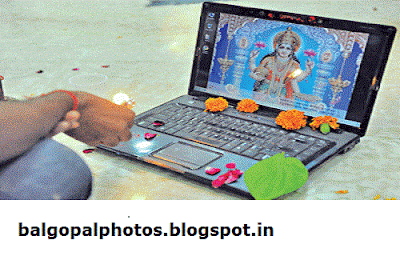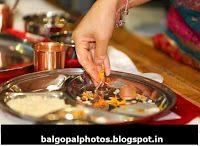Chopda poojan
Here Collection of photos of chopda poojan ,here you can read about the chopda poojan ,and see the images of the chopda poojan , now a days morden chopda poojan of the laptops ans smart phone with the books so enjoy it ,like us follow us ,subscribe us
Hindu see gods everywhere, whether its' plants of Basil (Tulsi Patra), Monkey God- Hanuman or Cow, Books are more important that we do pray Books since childhood as we see source of Ma Saraswati, same as that Hindu around the world do Chopra Punjan as they see source of Ma Laxmi, Regardless of rest of the world do Chopra Pujan or not but Gujarati Business men do their Chopda Pujan every year on day of Diwali. They start their first writing with God names on first page the Books of ledger. Chopda Puja during Diwali is performed mainly in western parts of India. Chopda Puja date is November 11th evening. Diwali is the last day of financial year in traditional Hindu business and Chopda Pujan is performed on the day on the new account books. This ritual is also known as Muhurat Puja.
Some of Laxmi Puja festival sms messages are as follows:
(1) Ashirwad bado ka
pyar dosto ka
duaen sabki
karuna Maa Ki
Laxmi Puja ki hardik shubhkamnaey
(2) May Maa Kali kalipuja
bring joy to you and your loved ones
May the Divine blessings Of Maa Kali be with you always
Happy Laxmi Puja
(3) Laxmi Puja Khushio ka
Ujalo ka
Laxmi Puja Aapki Jindagi khushio se bhari ho
Duniya ujalo se roshan ho,
ghar par Maa Kali ka Aagman ho…
Happy Laxmi Puja
(4) On this auspicious occasion of Laxmi Puja
I wish you are blessed with prosperity and
success by Ma Kali
HAPPY Laxmi Puja
(5) Fortunate is the one
Who has learned to admire,
But not to envy.
Good wishes for a joyous Laxmi Puja,
With a plenty of peace and prosperity.
(6) May maa bless you
With happiness all the year through!
Wishing you a happy Laxmi Puja
This puja is basically performed by the Hindu business community in Gujarat, Rajashtan and Maharashtra. All account books are kept for puja on the day and blessing is sought from Goddess Lakshmi and Ganesha.
In the new account books, people write Subh Labh and draw the sign of Swastik.
In some regions, Chopda Puja is also performed along with Kuber Puja.
Diwali is usually synonymous with the Maha Lakshmi puja, worship of the goddess of wealth, however, before the main Lakshmi puja is done, Goddess Saraswati, the goddess of education and knowledge is first attended to. In most cultures, on Diwali day, Goddess Saraswati holds equal importance as Goddess Lakshmi.
As per the ritual, on Diwali day, before the Maha Lakshmi Puja, ledger books or account books are worshiped in front of Goddess Saraswati, Lakshmi and Lord Ganesha, signifying the start of the new financial year according to the Hindu calender.
This ritual is called by different names in various parts of the country -- it's chopda (meaning book) pujan in Gujarati, Bhai-Khata for North Indians, and Sharda (meaning Goddess Saraswati) puja and Muharat pujan for others.
This ritual is mainly important for the business community. The business community, mainly in the North India, close all the accounts and present the 'Chopda', seeking the blessing for the next financial year. According to the Hindu calendar, financial year starts from the next day of Diwali.
Most businesses shut shop for Diwali on this day, yet invite its entire staff for the ritual. On this day, during the Saraswati puja, the new books of accounts that will be used in the new year, are worshipped. For decades, the ritual only included books of accounts, but now, with changing times, people even include computer printing papers as that is the main commodity used through the year.
An example of what is written on the first page of the books of accounts before laid out for the ritual
Inside the account book, people write 'Shubh' meaning auspiciousness, and 'Labh' meaning merit. They also make the 'Swastik' symbol to start the new business year.
During the ritual, vedas and mantras are chanted followed by the main Maha Laxmi Puja.
With Diwali around the corner, the streets of Bhuleshwar have lots of red chopdis (account books) on sale. Larger businesses may have switched to computers, but these cloth-bound books are still used by many smaller shops. Try going into Mangaldas Market, for example, and you will spot traders writing in them.
The traditional accounting system (Bahi-Khata) followed in Gujarat and Rajasthan is a full-fledged double entry system. It makes a double-entry for all transactions affecting real, nominal or personal accounts. These transactions are first entered in the rokad-bahi (cash book), and then posted into the khata-bahi (ledger). A nakal-bahi serves as the journal. Finally a trial balance (kaccha ankada) is also prepared. I have watched entries being written into these red books in some shops, and I'm tempted to walk up to someone and ask them to teach me how it works. But it's so intrusive!
The pages inside the book are also a reflection of the diverse cultural / business practices of Mumbai's trading communities. The daily sunrise and sunset times are mentioned, to accommodate some practices such as Jain community's requirement to know the 'hora' or muhurat. The Jain working day is broken into 12 horas, beginning at sunrise and ending with sunset. Each hora is influenced by a particular planet and may or may not be suitable for undertaking a new activity.





















0 comments:
Post a Comment